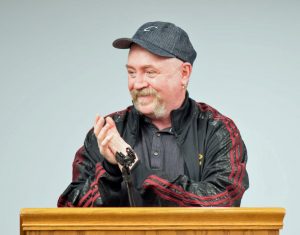 This is what my friend Sean Thomas Dougherty might say. He is a white man, who works the night shift and writes beautiful poems about being alive in this cruel world. He once wrote a poem about Biggie Smalls that made me believe he was from my neighborhood. And no matter how sad his songs have been, they make me believe there is a world just past suffering. And when I read him, even when he is suffering between those lines, I imagine the writing has given him some of that place that is more heaven than purgatory. Reginald Dwayne Betts Newsletter
This is what my friend Sean Thomas Dougherty might say. He is a white man, who works the night shift and writes beautiful poems about being alive in this cruel world. He once wrote a poem about Biggie Smalls that made me believe he was from my neighborhood. And no matter how sad his songs have been, they make me believe there is a world just past suffering. And when I read him, even when he is suffering between those lines, I imagine the writing has given him some of that place that is more heaven than purgatory. Reginald Dwayne Betts Newsletter
“Dougherty peels back all the self-protective shields under which has hidden truths even from himself, and lets the reader experience all the people who inhabit his world. In so doing, he reveals his own vulnerability.” Maria Mazziotti Gillan, Paterson Poetry Center. Sean was awarded the 2019 Paterson Poetry Prize
“A blue-collar, Rust Belt romantic to his generous, enthusiastic core, Dougherty has filled eight prior volumes with character sketches, pool hall odes (he now works in a pool hall), vaunting declarations, outcries, celebrations, protests, and promises, “in the rusting cities in the rusting places where we leaned against the wall, in the smoky haze of bar smoke and breath.” Publisher’s Weekly
Sean Thomas Dougherty’s poems vibrate with ‘red and blue braids of light’, in a voice that resonates and transports. Arresting, precise imagery from a poet of grand and memorable vision, this is the gypsy punk heart of American poetry.
Dorianne Laux

Dougherty’s brave poems transport us to the fault lines of our lives… where Kundera and Lorca meet the world of the holding cell and the chain-link fence. Jan Beatty
These soul-infused, deftly crafted stanzas pulse with the rhythms of a poet who lives his life out loud. Sean Thomas Dougherty has always shunned convention in favor of his fresher landscapes—vand this book will be the one that stamps his defiant signature on the canon. Patricia Smith
Yes, these poems glow with what is most tender in Lorca; but they also strut with what is most wiseass in O’Hara; they brood with what is most earnest in Akhmatova. In this book one hears the footsteps of all the teachers and friends and loved ones and strangers that people Sean Thomas Dougherty’s mind (the blood’s library) and heart (the blood’s dancehall)––Terrance Hayes.

A prodigious poet with a vast complex of influences cultivated through an exceptionally voracious appetite for reading, experiences, music and ever-alert observation, he offers up a language rendered, as he explains, in “three dimensions in which we say a word that becomes a form in the air that then is anchored in the space of an exchange between bodies.” The Utah Review
Sean Thomas Dougherty is the Miles Davis of the sentence. Peter Markus
